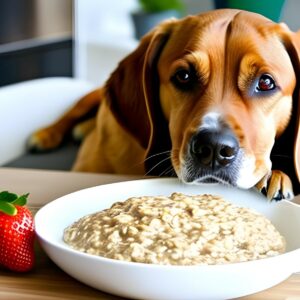I understand – it’s hard not to offer a piece of bacon to your pup when they smell that savory aroma of sizzling bacon.
So, you might be wondering, “Can dogs eat bacon?”
The quick answer is no. If you have a few minutes, let’s review bacon’s nutrition, the risks of feeding bacon, and what alternatives you can try.
Can Dogs Eat Bacon: Table of Contents
Can Dogs Eat Bacon?
No. bacon is loaded with salt, fat, and preservatives. The combination of salt and fat can cause pancreatitis – a serious and sometimes even life-threatening condition. Dogs should avoid even cooked bacon because no matter how you prepare it, it’ll still contain unhealthy content for their diet.
Can Dogs Eat Bacon Raw?
No. Raw bacon is the most unsafe type, and you should avoid feeding it to your pup at all costs.
As a veterinarian, I strongly advise against feeding raw bacon to dogs. Raw bacon, like other raw pork products, can pose several risks to your dog’s health:
Bacterial Contamination: Raw pork, including bacon, can be contaminated with harmful bacteria like Salmonella and E. coli. Feeding your dog raw bacon increases the risk of these bacteria causing foodborne illnesses in your pet. Dogs can get sick from these pathogens just like humans can.
Parasitic Infections: Pork can also carry parasites like Trichinella spiralis, which can be harmful to dogs if ingested. Cooking pork thoroughly is the best way to kill these parasites and make it safe for consumption.
If you want to share a treat with your dog, it’s best to choose safer options for canine consumption, like dog treats or small amounts of cooked, unseasoned lean meat.
Always consult your veterinarian before introducing new foods into your dog’s diet, especially if your dog has any underlying health conditions or dietary restrictions. Your vet can guide what is safe and appropriate for your individual pet’s needs.
Can Dogs Eat Bacon Grease?
No. Bacon grease contains a lot of salt and sodium, both hard to digest. These ingredients can lead to several health problems, such as dehydration. Dehydration will lead to excessive drinking.
Also, bacon grease is loaded with fats, potentially leading to an imbalance in your dog’s diet, obesity over time, and even heart disease.
These conditions can eventually lead to a life-threatening situation, so avoid including bacon grease into your pup’s diet (even in treats).
Can Dogs Eat Pork?
Yes, but only as a small, cooked, and unseasoned treat occasionally. While pork isn’t as unsafe as bacon, it’s still unhealthy for your doggo.
Pork meat is more likely to carry bacteria, parasites like trichinella, or worms than bacon.
Also, some dogs might have allergies to pork, resulting in digestive issues, loss of appetite, or even skin problems.
5 Reasons to Avoid Feeding Your Dog Bacon
To better understand why it might cause problems for your pup, let’s go through the potential risks of feeding bacon to your pup.
High-Fat Content
The high salt and fat content in bacon can contribute to long-term health issues in dogs. Excessive consumption can lead to obesity, potentially causing various health problems such as diabetes, heart disease, and joint issues.
Gastrointestinal Upset (Distress)
Dogs’ digestive systems can’t process bacon like ours. Feeding bacon to your dog can result in upset stomach, diarrhea, or other gastrointestinal issues, causing discomfort and distress to your furry friend.
Risk of Choking
Bacon is often served in strips or small pieces, making it a choking hazard for dogs. Dogs may eagerly gulp down bacon without proper chewing, leading to choking or blockages in the throat or digestive tract. These are dangerous conditions that require emergency intervention.
Salt Overload – Bloating
Symptoms of salt overload include excessive thirst, vomiting, diarrhea, tremors, and even seizures.
Just like in humans, salt overload causes excessive thirst in dogs too. When our four-legged friends are too thirsty, they’ll drink a lot of water, leading to a buildup of excess fluids and gases. This can cause gastric dilatation, a life-threatening disorder.
Pancreatitis
Feeding your dog too much bacon can lead to pancreatitis, a painful and potentially life-threatening condition. Pancreatitis occurs when the pancreas becomes inflamed due to the body’s inability to handle excessive fat consumption.
Symptoms of pancreatitis include:
- vomiting
- diarrhea
- severe abdominal pain
How Much Bacon Can a Dog Have?
You’ve probably heard conflicting opinions on this topic, but it all comes down to the amount of bacon. While a little piece of bacon as a treat (occasionally) can provide your pup with a decent amount of protein, frequent bacon consumption can lead to an unhealthy diet and cause health issues over time.
Even though bacon isn’t toxic to dogs like chocolate, it’s still unhealthy for them, so it’s best to avoid sharing that crispy, sizzling piece of bacon with your doggo.
What Happens If My Dog Eats Bacon?
The outcome can differ depending on the amount and type of bacon your dog eats. For example, if it’s a small amount, your dog might experience some tummy pain and loss of appetite for a while.
On the other hand, a large amount of bacon will cause vomiting, diarrhea, and a potential risk of developing pancreatitis – if this happens, you’ll see symptoms such as repeated episodes of vomiting, lethargy, loss of appetite, and even blood in their stool.
Also, keep in mind that raw bacon is much more unsafe and harder to digest than cooked one. If notice any of the symptoms, take your pup to the vet right away for treatment.
Can Bacon-Flavored Treats Be Safe For Dogs?
The answer is yes – bacon-flavored treats can be safe for dogs. If your dog loves the taste of bacon, you can also explore dog foods with bacon flavoring.
Dog treats with bacon flavoring are much safer than bacon for your doggo’s digestive system.
Here are a few examples to consider:
- Beggin’ Bacon-Flavored Dog Treats by Purina
- Bacon-Flavored Dog Snacks by Canine Carry-Outs
- Bacon-Flavored Bone Treat by Nylabone
The Healthiest Alternative
Also, the healthiest alternative to consider instead of bacon is cooked chicken or turkey. It should be skinless, boneless, and plain – a lean protein source most dogs enjoy. This means no salt, seasoning, etc.
Homemade Turkey Treat Recipe
Now that you know your dogs should avoid bacon, you might be wondering what are the safer alternatives to bacon for dogs. So, let’s make a quick and easy-to-make recipe for turkey-based dog treats for your pup.
Ingredients
- 1 cup cooked and shredded turkey (skinless, boneless)
- 1/2 cup mashed sweet potato (unsalted)
- 1/4 cup oat flour (or whole wheat flour)
- 1 egg
- 1/4 cup finely chopped spinach (optional)
- 1 tablespoon olive oil
Instructions:
- Preheat your oven to 350°F (175°C) and line a baking sheet with parchment paper.
- In a mixing bowl, combine the shredded turkey, mashed sweet potato, oat flour, egg, and chopped spinach (if you’re using it). Mix everything together until you have a dough-like consistency.
- Roll out the dough on a lightly floured surface to about 1/4-inch (about half a centimeter) thickness.
- Use cookie cutters or a knife to cut out fun shapes or squares from the dough.
- Place the treats on the prepared baking sheet, leaving a little space between each one.
- Brush the tops of the treats with a thin layer of olive oil to give them a nice golden color.
- Bake in the preheated oven for about 20-25 minutes, or until the treats turn golden brown and firm.
- Once done, remove from the oven and let them cool completely on a wire rack.
- Store the turkey and sweet potato treats in an airtight container in the refrigerator for up to two weeks. You can also freeze them if you want to keep them for longer.
Bacon: Nutrition Table
| Bacon (raw) | 3.53 oz/100 g |
| Total fat | 42 g |
| Saturated fat | 14 g |
| Transfat regulation | 0.00 g |
| Cholesterol | 110 mg |
| Sodium | 1717 mg |
| Potassium | 565 mg |
| Total carbohydrate | 1.4 g |
| Dietary fiber | 0 g |
| Sugar | 0 g |
| Protein | 37 g |
| Vitamins, minerals, etc. | % daily value |
| Vitamin B6 | 15% |
| Vitamin D | 10% |
| Calcium | 1% |
| Iron | 7% |
| Magnesium | 8% |
| Cobalamin | 20% |
| Total calories | 541 |
My Senior Paws is a participant in the Amazon Services LLC Associates Program, an affiliate advertising program designed to provide a means for sites to earn advertising fees by advertising and linking to Amazon.com. We also participate in other affiliate programs which compensate us for referring traffic.




